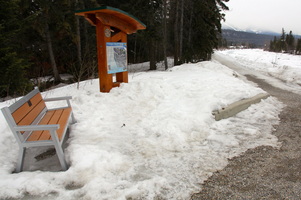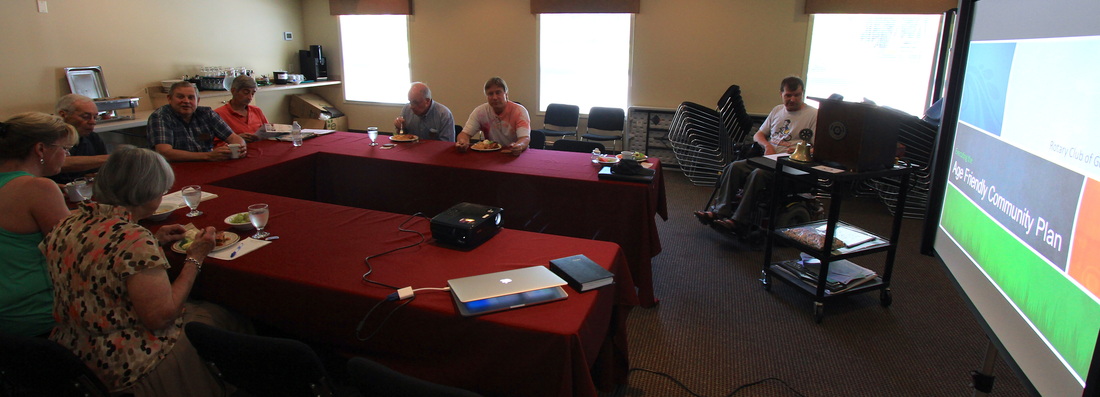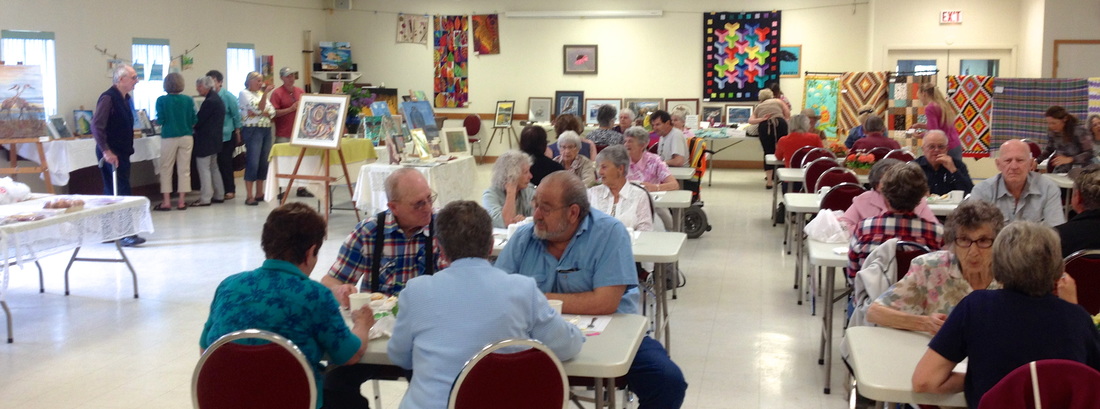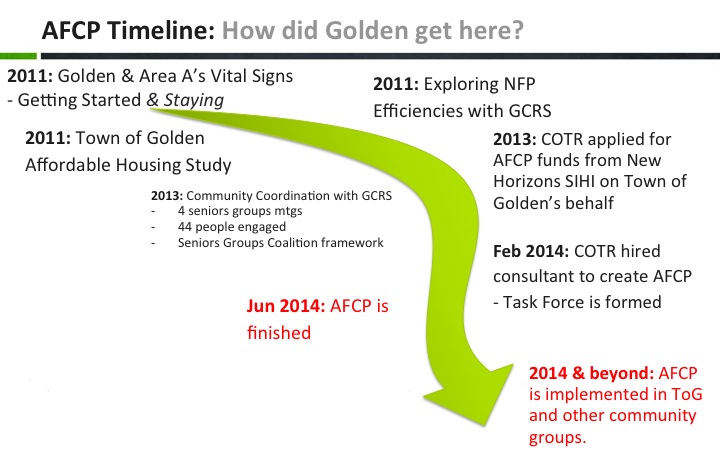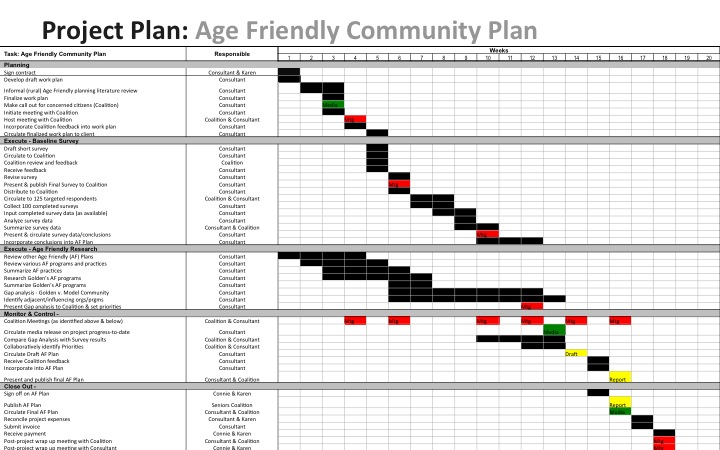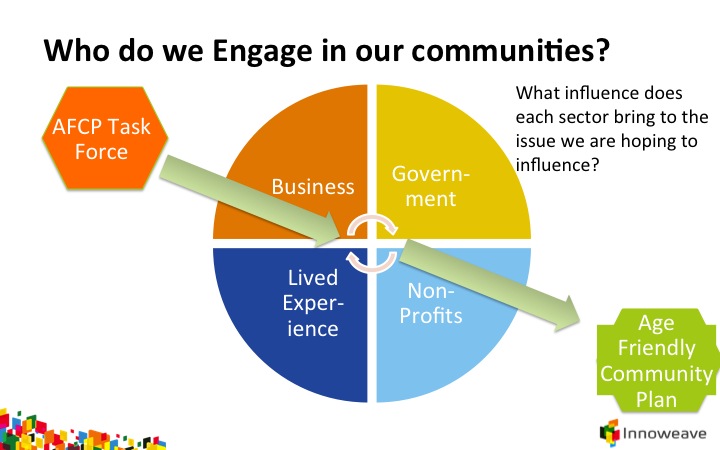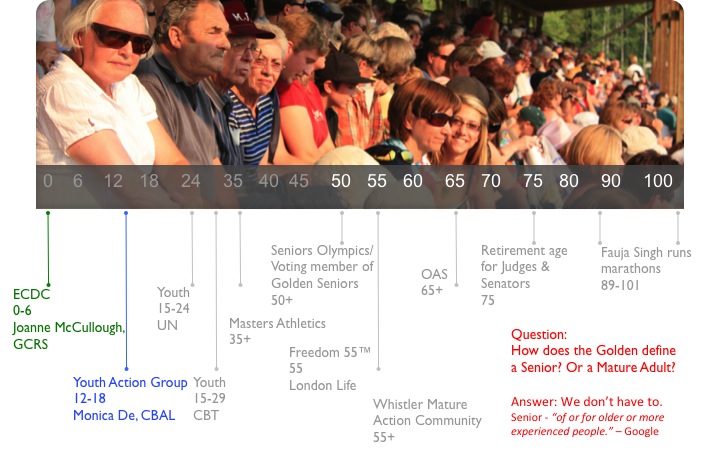Golden's Age Friendly Community Plan (AFCP 2014)

In 2013, the Town of Golden (with the administrative support of the College of the Rockies) received a grant from the Seniors' Housing and Support Initiative (SHSI) to complete an Age Friendly Community Plan (AFCP). The
SHSI program is intended to assist local government to support aging
populations, develop and implement policies and plans and/or develop
projects that enable seniors to age in place and facilitate the creation
of age friendly communities.
The Ministry of Health supported the initiative by providing funds to incorporate a focus on age friendly projects. The plan brought together many senior-focused groups and programs and was completed in July 2014.
Age friendly communities are places where older people can live active, socially engaged lives through polices, services and structures designed to support them.
Age friendly communities:
• Recognize the wide range of capacities and resources among older people
• Anticipate and respond flexibly to aging-related needs and preferences
• Respect decisions and lifestyle choices
• Protect those who are most vulnerable
• Promote inclusion and contribution in all areas of community life
Golden's AFCP Task Force participated in 6 meetings, administered a survey to over 200 participants and analyzed the results. Golden's Plan is interdependent on the participation and collaboration between local government, non profits, businesses and residents.
After the plan was crafted and distributed, the Age Friendly Community Committee has continued to meet monthly, with Columbia Basin Alliance for Literacy (CBAL) holding space to discuss and move forward the priorities of the plan and other issues as they come up. This committee works very similar to the Early Childhood Development Coalition (ECDC), which is also hosted by Golden Community Resources Society (GCRS).
The Ministry of Health supported the initiative by providing funds to incorporate a focus on age friendly projects. The plan brought together many senior-focused groups and programs and was completed in July 2014.
Age friendly communities are places where older people can live active, socially engaged lives through polices, services and structures designed to support them.
Age friendly communities:
• Recognize the wide range of capacities and resources among older people
• Anticipate and respond flexibly to aging-related needs and preferences
• Respect decisions and lifestyle choices
• Protect those who are most vulnerable
• Promote inclusion and contribution in all areas of community life
Golden's AFCP Task Force participated in 6 meetings, administered a survey to over 200 participants and analyzed the results. Golden's Plan is interdependent on the participation and collaboration between local government, non profits, businesses and residents.
After the plan was crafted and distributed, the Age Friendly Community Committee has continued to meet monthly, with Columbia Basin Alliance for Literacy (CBAL) holding space to discuss and move forward the priorities of the plan and other issues as they come up. This committee works very similar to the Early Childhood Development Coalition (ECDC), which is also hosted by Golden Community Resources Society (GCRS).
Golden is an Age Friendly Community
|
Age Friendly Community Committee Planning
|
|
On June 10, 2015, Golden was recognized as an age friendly community by AFBC.
"To achieve recognition, four key steps must be taken. These include establishing an age-friendly advisory or steering committee, passing a council or district board resolution, conducting an age-friendly assessment, and developing and publishing an action plan." The Age Friendly Community Committee is open to anyone interested in furthering the services and programs for older adults in Golden & Area A. All documentation from the AFCP and meetings can be found below. If you have any questions about the Committee or the AFCP, please contact Ryan Watmough at [email protected] or 250.344.8610. |
With the support of Monica De from the Columbia Basin Alliance for Literacy (CBAL), the Age Friendly Community Planning Committee met 3 times and developed an condensed Action Plan, based on the AFCP Plan presented to Town Council July 23, 2015.
The Committee/Coalition continues to meet each month (3rd Wednesday). The meeting location changes, based on the availability of space, timing topics and guest speakers. Minutes from each Coalition meeting can be found here. Please feel free to download and save them for reference. Additional Resources:
The following resources have newsletters that we encourage everyone to sign up for. BC Healthy Communities - http://bchealthycommunities.ca/ BC Family & Social Supports (Seniors) - http://www2.gov.bc.ca/gov/content/family-social-supports/seniors Public Health Agency of Canada - http://www.phac-aspc.gc.ca/seniors-aines/afc-caa-eng.php |
AFC Committee Meetings
Everyone is welcome to attend.
We have been rotating our meeting spaces so that residents can experience all of our community spaces. Agenda items can be submitted to [email protected] up to 48 hours before each meeting.
Please send any suggestions for guest speakers to [email protected].
We have been rotating our meeting spaces so that residents can experience all of our community spaces. Agenda items can be submitted to [email protected] up to 48 hours before each meeting.
Please send any suggestions for guest speakers to [email protected].
AFCC Meeting Minutes, Plans & Presentations
|
| ||||||||||||||||||||||||||
Golden's AFCP Plan is Complete & Approved!
Countless hours from the AFCP Task Force and hundreds of surveys from local residents has resulted in Golden's first Age Friendly Community Plan. The Plan was submitted to Town Council on July 15th, 2014.
|
AFCP Report (PDF)
AFCP Needs Assessment (Survey)
AFCP Needs Assessment (Survey) Results
Age Friendly Committee's Terms of Reference
|
AFCP Report (Word)
AFCP Recommendations (included in the AFCP Report)
Town of Golden Council Resolution
| ||||||||||||||
Presentations - Plan Roll-Out
The AFCP Task Force was able to present the update the Plan (V10) to local leaders. Without a backbone organization to take the Plan on, each relevant group will be responsible for communicating their progress and challenges over the next 6 months. Hard copies of the Plan can be found at the Town of Golden office and College of the Rockies. The most up-to-date Plan can be found above.
| afcp_rollout-jul292014.pdf |
Presentation - Town of Golden Council - July 15, 2014
Ryan Watmough made a delegation at a regular Council Meeting. In short, the presentation outlined the next steps towards Golden becoming officially recognized as an Age Friendly Community.
| afcp_councilppt-jul152014.pdf |
Presentation - Rotary Club of Golden - June 19, 2014
Ryan Watmough was invited to make a brief presentation to the Rotary Club. The presentation focused on 3/8 relevant AFCP Dimensions: 1. Outdoor spaces and public buildings, 2. Transportation and 5. Social Participation.
| afcp_rotaryppt-jun162014.pdf |
Presentation - Town Staff - June 12, 2014
Ryan Watmough made a brief presentation to the management staff at the Town of Golden.
| afcp_staffppt-jun122014.pdf |
Informal Discussion - Town Council - June 10, 2014
The AFCP Task Force was asked to attend a discussion about the Plan and possible tactics with the Town of Golden Council.
| afcp_councilppt-jun102014.pdf |
Meeting 6 - May 29, 2014
At this rescheduled, 2-hour long meeting, the gap analysis was presented. Recommendations were then identified to address the gaps. These recommendations will then be weighted, in light of the survey respondents' priorities.
| afcp-mtg6-may292014.pdf |
Meeting 5 - May 8, 2014
The Task Force began to review the compiled data from the survey; breaking out into small groups to analyze the data in more detail and by each Dimension.
Meeting 4 - April 3, 2014
The April 3rd meeting presentation can be found below.
| afcp-mtg4-apr32014.pdf |
Meeting 3 - March 27, 2014
The March 27th meeting was 2.5 hours long and involved finalizing survey questions, delving deep into the 8 Dimensions of Age Friendly Community Planning.
Meeting 2 - March 20, 2014
Files from the March 20th meeting presentation can be found below, along with new resource files from small and rural communities across Canada.
|
Meeting Presentation
CSRD, BC
Rural Development Institute
Nelson, BC
|
Below, one can find the University of Waterloo's AFCP Instrument Database, which is invaluable when writing questions for a community's Needs Assessment.
Revelstoke
Clarington, ON
Milton, ON
| ||||||||||||||||||||||||||||||||||
Meeting 1 - March 6, 2014
The following files include the presentation made at the March 6th meeting. This presentation includes an overview of 2013 Community Coordination project "Seniors Groups" meetings.
|
| ||||
AFCP Media Releases
Over the duration of this project, media releases will be posted here.
|
| ||||
| seniors_advocate_survey_news_release.pdf |
Age Friendly Community Planning Steps & Dimensions
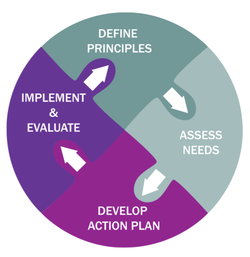
According to "Finding the Right Fit: Age-Friendly Community Planning", there are 4 steps involved in the creation of a solid AFCP.
Step 1: Defining Local Principles
Step 2: Custom Needs Assessment
Step 3: Developing an Action Plan
Step 4: Implementation and Evaluation
A solid AFCP should address 8 dimensions from WHO’s Global Age-Friendly Cities: A Guide (2007):
1. Outdoor spaces and Public Buildings
2. Transportation
3. Housing
4. Social Participation
5. Respect and social inclusion
6. Civic Participation and employment
7. Communication and information
8. Community support and health services
Step 1: Defining Local Principles
Step 2: Custom Needs Assessment
Step 3: Developing an Action Plan
Step 4: Implementation and Evaluation
A solid AFCP should address 8 dimensions from WHO’s Global Age-Friendly Cities: A Guide (2007):
1. Outdoor spaces and Public Buildings
2. Transportation
3. Housing
4. Social Participation
5. Respect and social inclusion
6. Civic Participation and employment
7. Communication and information
8. Community support and health services
